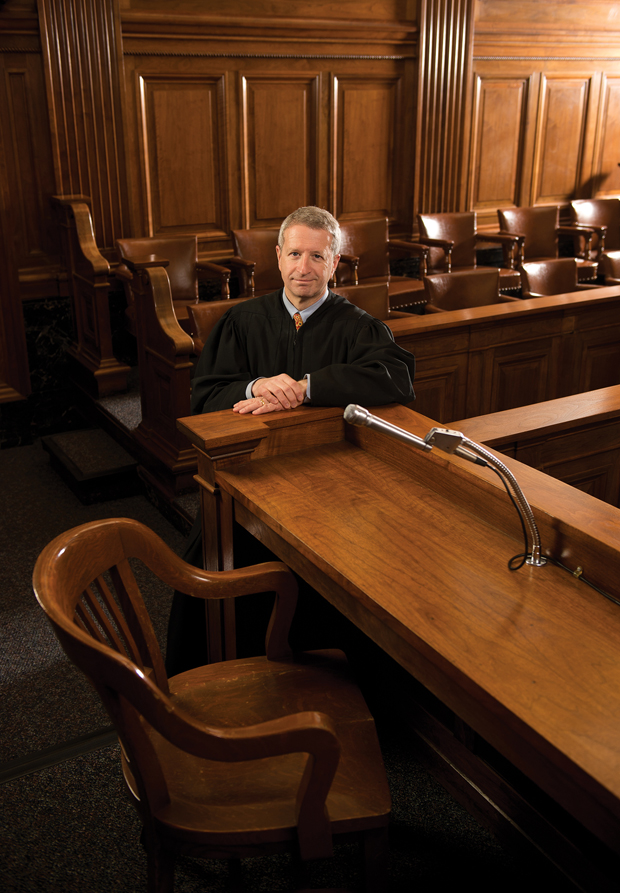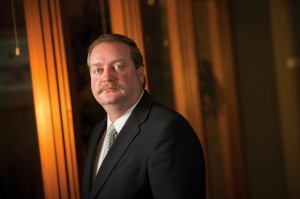Judging the experts: Daubert standards resolve some skepticism, but not all
By: JESSICA STEPHEN//March 2, 2015//
Judging the experts: Daubert standards resolve some skepticism, but not all
By: JESSICA STEPHEN//March 2, 2015//

Jim Leatzow has heard the names.
“Some say hired gun. Some refer to it as more of a prostitute,” said Leatzow, a former insurance agent and founder of Leatzow & Associates Inc., Three Lakes.
The names refer to his work as an expert witness, something Leatzow started doing in 2005. He has been approached for his insurance expertise more than 800 times, formally retained about 250 times, deposed more than 60 times and retained in nearly 50 arbitrations. He has testified about a dozen times in state and federal court.
“My reputation is squeaky clean,” he said. “I don’t play games. I’m not a hired gun. I view my role as an arbitrator and witness expert as one who is seeking the truth. Those are my marching orders. And I take my role very seriously.”
But the idea of a hired gun, an expert willing to bend the truth to benefit the bottom line, has theatrical appeal. Perhaps, court officials said, there was even a time when those kinds of credibility uppercuts rightfully were reserved for the special class of witness allowed to offer opinion instead of straight fact.
But with the advent of online accountability and the ability, as outlined under the Daubert standard, to challenge expert qualifications, some wonder if those days might be numbered.
“With the Internet, if there’s an expert taking an extraordinary position, that’s the kind of thing that gets found out,” Milwaukee County Circuit Judge Richard Sankovitz said. “They’re going to be exposed. As a result, there’s probably less cause to be hurling epithets like ‘whore’ or ‘prostitute.’”
There also are fewer opportunities.
“We are less frequently confronting problems with expert witnesses because we have way fewer jury trials,” said Sankovitz, a judge for 18 years who has been handling civil cases since 2012.
During his first civil rotation, from 2004 to 2008, Sankovitz presided over 50 trials. This time around, he’s had only nine, and he’s more than halfway through his rotation.
But attorney Kevin Lonergan said he still finds plenty of cause to employ expert witnesses.
“I have an expert in every single case that we file in court,” said Lonergan, president of Herrling Clark Law Firm Ltd. Appleton. “And even cases where we haven’t filed suit yet, we’re working with experts on the case for settlement.”
Without experts, he said, he runs the risk of not being able to meet his burden of proof.
“In personal injury, we’ll need a health care provider to identify the injuries, whether treatment is related to the accident, the future medical needs and the prognosis,” Lonergan said. “The plaintiff has the burden of proving each and every item of damage, so if we don’t present opinions that meet that burden, we can’t make the claim for that item.”
Not that putting an expert on the stand is without risk.
“I’ve had experts say, ‘Kevin, I can’t help your client here. I can’t testify that they’re going to need the treatment they think they’re going to need,’” Lonergan said. “I’ve worked with experts who try very hard to play fair.”
But, he said, “an independent expert is not independent at all.”
“They’re very dependent on who is paying their bill,” Lonergan said. “So, I think the defense doctors are hired guns.”
It’s an argument Paul Rodrigues, an accountant turned expert witness for Chortek LLP, Waukesha, has heard before, and one he understands.
“If somebody hasn’t been fully paid for work they’ve done, there may be some tendency to tell counsel what they want to hear so that their bills get paid,” he said. “But that’s why I always make sure I’ve got retainers ahead of time. And I don’t do contingency work, so I’m not worried about whether I get paid or not.”

Rodrigues started his career at Price Waterhouse LLP nearly 10 years ago where he worked as an expert witness. He has spent eight years working full-time as a witness and consultant, testifying about 20 times to qualify damages and offer insights into forensic accounting for fraud investigations.
“I’ve found, many times, they’ll ask you, ‘Where do you see this going?’ and I’ll give them an honest opinion,” he said. “If I think they need to settle the case, I’ll tell them, ‘I think you need to settle the case because if I’m called on the stand and asked I’ll have to say, ‘Yes, those are very large offsets against your client.’’ I just call it like I see it.”
It’s a credo Leatzow also lives by.
“If I think they are going to lose, I tell them right up front,” he said. “I’ve encouraged attorneys to get rid of cases because I would eat them alive if I testified for the other side.
“If it’s defensible and it sounds reasonable, then I would at least be in the running to be retained as an expert.”
Leatzow said his honesty is a mix of principle and good business sense.
“When you compromise your integrity its gone forever,” he said. “And if opposing counsel finds out, and I think they generally will, they’re going to annihilate you.”
That is why, Sankovitz said, fewer experts are willing to play fast and loose with the facts. The adoption of the Daubert standard in February 2011 also played a key role, partially because it has contributed to less “junk science” on the witness stand, he said.
“Basically, [the standard dictates] whether an expert is reliably applying a reliable method,” Sankovitz said.
Rodrigues said he thinks Daubert also has reduced the temptation to tweak testimony for financial gain. Before Daubert, he said, some experts were paid based on the outcomes of their cases; if they lost, they got nothing. It created a slippery slope, he said, and reinforced the idea of experts as hired guns.
Today, he said, there is less of that.
And yet the image persists.
Sankovitz said he thinks he understands why.
“People are quite happy to have pat explanations for things,” he said. “It’s just easier to write off the opposing expert as, ‘Well, you paid for that opinion.’ Well, you paid your expert, too.”
Legal News
- State Bar leaders remain deeply divided over special purpose trust
- Former Wisconsin college chancellor fired over porn career is fighting to keep his faculty post
- Pecker says he pledged to be Trump campaign’s ‘eyes and ears’ during 2016 race
- A conservative quest to limit diversity programs gains momentum in states
- Wisconsin prison inmate pleads not guilty to killing cellmate
- Waukesha man sentenced to 30 years for Sex Trafficking
- 12-year-old shot in Milwaukee Wednesday with ‘serious injuries’
- Milwaukee man convicted of laundering proceeds of business email compromise fraud schemes
- Giuliani, Meadows among 18 indicted in Arizona fake electors case
- Some State Bar diversity participants walk away from program
- Wisconsin court issues arrest warrant ‘in error’ for Minocqua Brewing owner
- Iranian nationals charged cyber campaign targeting U.S. Companies
WLJ People
- Power 30 Personal Injury Attorneys – Russell Nicolet
- Power 30 Personal Injury Attorneys – Benjamin Nicolet
- Power 30 Personal Injury Attorneys – Dustin T. Woehl
- Power 30 Personal Injury Attorneys – Katherine Metzger
- Power 30 Personal Injury Attorneys – Joseph Ryan
- Power 30 Personal Injury Attorneys – James M. Ryan
- Power 30 Personal Injury Attorneys – Dana Wachs
- Power 30 Personal Injury Attorneys – Mark L. Thomsen
- Power 30 Personal Injury Attorneys – Matthew Lein
- Power 30 Personal Injury Attorneys – Jeffrey A. Pitman
- Power 30 Personal Injury Attorneys – William Pemberton
- Power 30 Personal Injury Attorneys – Howard S. Sicula











